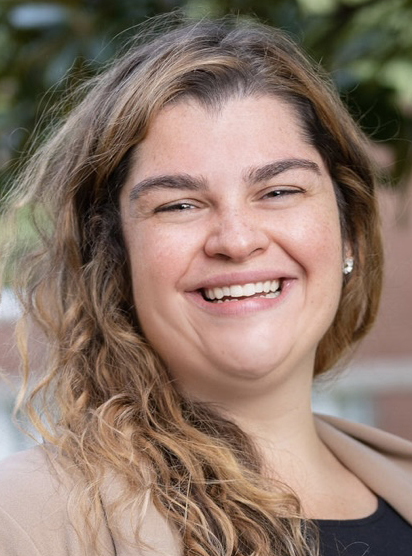I read the letter Pastor Mike Law wrote and it was a waste of my time.
I knew it would be, but I just wanted to feel angry all over again because it feels good until it doesn’t. Same stuff, different day. I am not writing this as any logical argument or profound case for why women should be pastors. You either will or will not come to that conclusion on your own. But it is important to tell our stories and the things we have learned along the way.

Hollis Dudgeon
In high school, I became a born-again Southern Baptist. Since childhood, I was drawn to religion and to God, raised in a family that went to church then stopped without much explanation around the age of 8. Curious to learn more about God and hungry for a place to belong, I started going to youth group with one of my friends from high school. It was there I was embraced and found belonging both to God and community. It changed my life.
It also caused me a lot of inner turmoil.
One Sunday, the pastor said something along the lines of “if the earth wasn’t created in seven literal days, then maybe Jesus didn’t rise from the grave.” Woah, what? Even at 16, that felt like a weird hill to die on.
I was confused by statements like this that pointed to the Bible’s inerrancy and infallibility. Surely there were more important things than needing to prove the Bible is word-for-word accurate and, if it isn’t, then we might as well just throw it all out.
“Was this what God’s ‘love’ felt like?”
I felt trapped by this, unsure if I could believe this. And yet if I didn’t, maybe I wasn’t a real Christian and I was actually on the fast track to hell. It sounds funny now, but then I really believed it. I was constantly scared I was going to hell, unsure if I was truly saved. I was scared for myself and scared for those I loved.
What a heavy way to live. Was this what God’s “love” felt like?
I also felt called to be a youth pastor, eager to help transform lives the way mine had been changed. Called to provide a place of belonging for youth to know they are loved. I didn’t grow up Southern Baptist, so I didn’t know women couldn’t be pastors.
When I named this calling to my friends and to people within the church, I don’t remember being met with outright objection, maybe silence or a little uneasiness. No one told me I couldn’t, but I don’t remember anyone telling me I could.
What I do remember is expressing this desire to one of the youth helpers who said to me, “No one can limit what God can do.” It is hard to describe the impact of that moment on my life in discerning who God was calling me to be.
“No one can limit what God can do.”
I am not a Southern Baptist anymore, but I am a youth pastor. I am ordained and affirmed by a church that belongs to the Cooperative Baptist Fellowship, and I work at both a college and church that affirm my calling to ministry. There are things I had to leave behind to get here and folks along the way who helped me to do so.
I left behind the commitment to biblical inerrancy that was at the heart of all the things I couldn’t reconcile with my understanding of God, ideas given to me by the Southern Baptist church. Things like the exclusion of women from ministry, the exclusion of LGBTQ people as wholly and dearly loved by God, and the commitment to one singular understanding of Scripture that mostly just casts God as the bad guy.
I found a new way to read Scripture that is thoughtful, curious and liberative. The only things I found on the road I was told would damn me was freedom, lightness and the love of God.
There are good things I still carry with me from my Southern Baptist days. Namely, a deep love for people and a faithful way of living. There are people I met in my Southern Baptist days I know still care about me, even if they are unsure how to love me. This is the sad part to me when the Southern Baptist Convention draws lines in the sand under the guise of clarifying confusion. Their brash commitment to identifying and excluding women (and other folks) feels disconnected from the day-to-day reality of people’s lives, their commitment to love of God and neighbor, and their ministries.
Maybe folks like Pastor Mike Law feel called to take the moral higher ground in the name of Jesus, but at what cost to people’s lives?
I’m still learning these days. I don’t question my calling any more. I do sometimes still get my feelings hurt when I let myself be surprised by the things folks around me believe. I’m trying to learn not to get upset so easily. I’m asking myself what it would look like to lean into patience, understanding and grace if I start with that first for myself.
And I think about what Nadia Bolz-Weber says a lot, “The good and bad news of the gospel is that it is extended to both you and your worst enemy.”
So my prayer sounds something like this these days, “God help me to see Pastor Mike and those like him as your beloved.” The tension begins to diffuse, God’s grace begins to reach into my heart, and I carry onward in the work I am called to do.
Hollis Dudgeon directs Faithways Academy at Georgetown College in Georgetown, Ky., and serves as minister to families at Ridgewood Baptist Church in Louisville, Ky. She is a graduate of Georgetown College and Wake Forest University School of Divinity.
Related articles:
If you’re going to quote 1 Timothy 3:2, be sure to read Exodus 20:17 | Opinion by Brad Bull
A response to ‘The List’ | Opinion by Alice Cates Clarke
I’m one of the female pastors on the SBC’s hit list | Opinion by Carlisle Davidhizar
What Mike Law got right | Opinion by Jennifer Hawk
How dare they publish that list | Opinion by Arthur Wright Jr.


